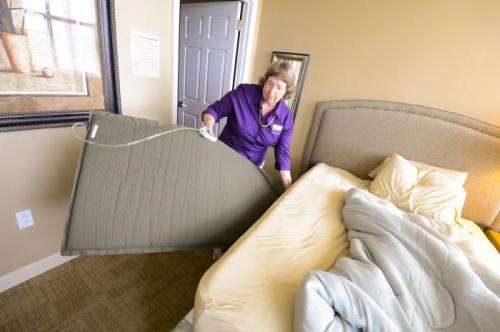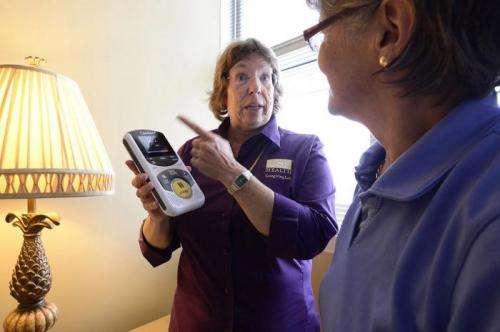Study investigates whether improving sleep reduces heart disease risk in caregivers

The University of South Florida College of Nursing is conducting research to improve sleep in those caring for people with dementia and Alzheimer's disease, with the aim of determining if better sleep affects heart health. The $1.9-million, four-year study funded by National Institute on Aging (NIA), "Improving Dementia Caregiver Sleep and the Effect on Heart Disease Biomarkers," is led by USF College of Nursing Professor and Endowed Chair Meredeth Rowe, RN, PhD, FGSA, FAAN.
Fifteen million Americans provided an estimated 17.5 billion hours of unpaid care to people with Alzheimer's disease and other dementias in 2012, according to the Alzheimer's Association. Recent studies indicate that caregivers, unpaid family members or friends who assist people with Alzheimer's with daily activities, may experience sleep loss from the constant demands of caregiving.
The College of Nursing study tests the relationship between caregiver sleep and heart disease to help understand what negatively affects caregiver health.
"Caregiving and lack of sleep each separately increase the risk of heart disease," Dr. Rowe said. "We want to discover whether improving sleep in caregivers lowers that risk."
According to the 2006 Institute of Medicine (IOM) report "Sleep Disorders and Sleep Deprivation: An Unmet Public Health Problem," the cumulative effects of sleep loss and sleep disorders have been associated with a wide range of adverse health consequences including increased risk of hypertension, diabetes, obesity, depression, heart attack, and stroke.

"The College of Nursing at the University of South Florida is transforming lives through research to improve the health of patients and their caregivers," said Dianne Morrison-Beedy, PhD, RN, WHNP-BC, FNAP, FAANP, FAAN, senior associate vice president of USF Health and dean of the College of Nursing. "We're making life better by transforming the health care of the family members who provide essential home care for persons with dementia. These caregivers fill an often unrecognized role in the healthcare system."
The primary focus of Dr. Rowe's research is finding an effective and easy-to-use treatment that can improve sleep in Alzheimer's caregivers to increase their overall health and reduce the nursing home placement of people with dementia.
"When I was working on ways to provide caregivers better quality of sleep, I looked for technologies that might help and there were none," Dr. Rowe said. "I realized that unless I invented a system that allowed them to sleep well, I was never going to have an impact on improving their sleep."
CareAlert™, a new night monitoring system designed by Dr. Rowe and Caregiver Watch, LLC, provides reliable alerts to caregivers whenever a person with dementia leaves the bed and wanders through the house. The system helps the caregiver rest easier through the night, and improves the overall safety of the person with dementia. The findings of a study testing the effectiveness of CareAlert™ were published by Dr. Rowe and colleagues in Alzheimer's & Dementia: The Journal of the Alzheimer's Association, in 2009. The researchers reported that use of CareAlert™ reduced nighttime injuries and unattended home exits by 85 percent over a period of 12 months.
"Dr. Rowe's research seeks not only to improve caregiver sleep, but also to better understand the relationships between sleep and changes in heart health," said Cindy L. Munro, PhD, RN, ANP-BC, FAAN, professor and associate dean for research and innovation at the USF College of Nursing.
In the latest research, Dr. Rowe is evaluating whether a combined intervention using CareAlert™ and cognitive-behavioral therapy for insomnia improves sleep in individuals who care for people with dementia and Alzheimer's who wake up at night. The study, conducted in the USF College of Nursing Caregiving Laboratory, will include as many as 100 participants. All will receive the CareAlert™ device and one of two sleep therapies assigned at random.
















